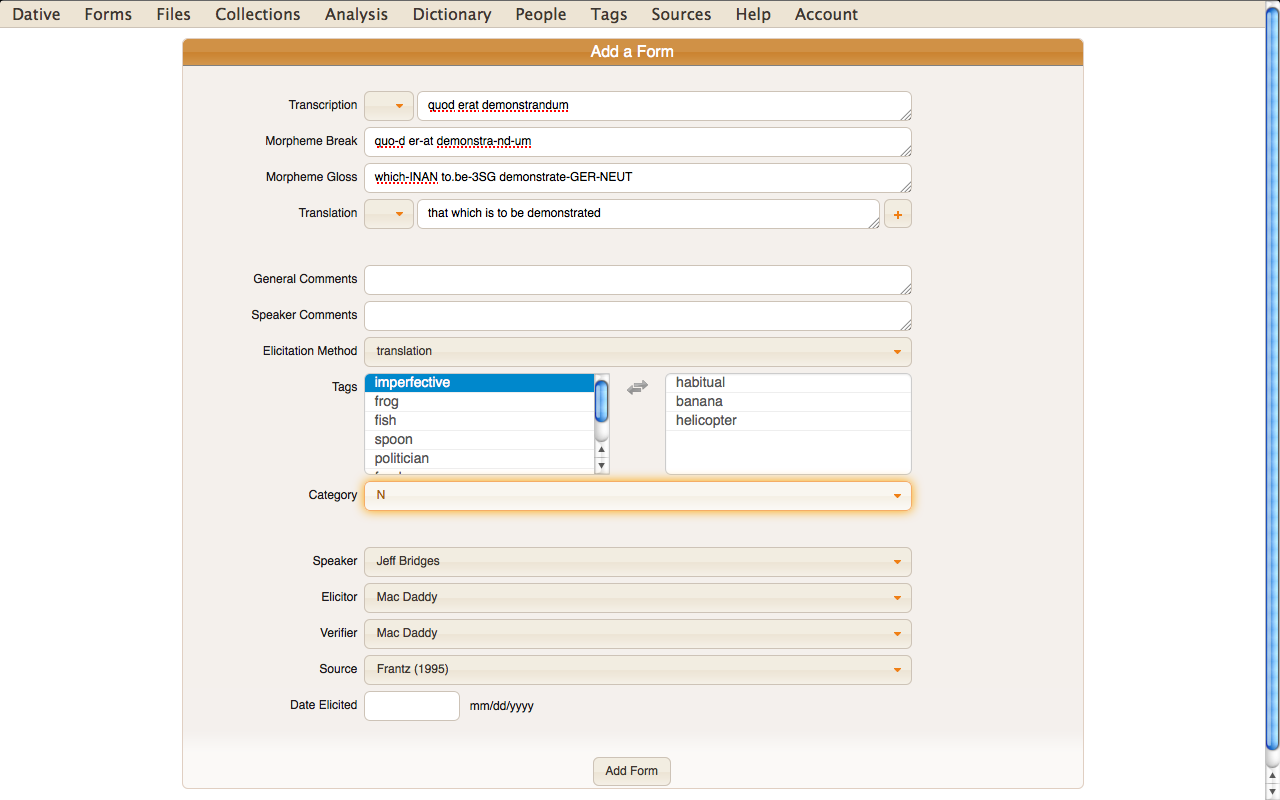Dative is a browser-based application for linguistic fieldwork and language documentation.
Its high-level goals are:
-
to interface with multiple server-side backends (FieldDB corpora, OLDs)
-
to incorporate the best parts of existing linguistic fieldwork database application GUIs:
Dative is open source, just beginning, and under active development.
- Backbone
- CoffeeScript
- Mocha/Chai tests
- Grunt task automation
First, make sure you have NodeJS >= 0.10 installed. Then install the Grunt command line interface (CLI):
$ sudo npm install -g grunt-cli
Then clone the dative repo and move into the clone:
$ git clone https://github.com/jrwdunham/dative.git
$ cd dative
Then install the Node dependencies:
$ npm install
Then install the Bower dependencies for the app and the tests:
$ bower install
$ cd test
$ bower install
$ cd ..
To serve the app with livereload, run:
$ grunt serve
The serve task generates source map files that Chrome's developer tools can recognize. This means that you can view the CoffeeScript source in the browser and can set breakpoints, etc. For some docs on CoffeeScript source maps and JavaScript debugging in Chrome, see:
- http://www.html5rocks.com/en/tutorials/developertools/sourcemaps/
- https://developer.chrome.com/devtools/docs/javascript-debugging
To run the tests and view the Mocha print-out in the browser, run:
$ grunt serve:test
After running the above command, the browser will automatically refresh whenever a source file or a test file is saved. This allows you to code with constant updates showing which tests are passing.
To build the app in the dist/ directory:
$ grunt build
To build the app in the dist/ directory and serve the result:
$ grunt serve:dist
To validate the CoffeeScript using coffeelint:
$ grunt lint
To run the tests and view the results in the command line (currently not working):
$ grunt test
To generate the docco HTML docs using the comments in your source files:
$ grunt docs
The above command generates files in the docs/ directory. Because docco overwrites files of the same name in different directories, I have configured the Gruntfile to rename each file for doc generation using the file's path.
Long story short: we are not currently using Compass/Sass/SCSS.
The default grunt file from the Backbone Yo generator uses the grunt-contrib-compass Grunt plugin to convert SCSS/Sass files to CSS. This requires that Ruby, Sass, and Compass >=0.12.2 be installed. If you're on OS X or Linux you probably already have Ruby installed; test with ruby -v in your terminal.
I have been unable to successfully install Compass on Debian. Following http://www.rosehosting.com/blog/install-ruby-sass-and-compass/, I did the following:
$ sudo apt-get install rubygems
$ sudo gem install compass
I can find compass in /var/lib/gems/1.8/gems/compass-0.12.7/bin/compass; however, the Grunt tasks are unable to locate it (despite how I alter my $PATH).
On other Unix systems (with Ruby installed), successfully installing Compass and Sass may be as easy as running:
$ sudo gem update --system && gem install compass
I had no trouble installing Compass/Sass on my Mac OS X system and running the default Yo Backbone generator's Gruntfile. However, since Debian is not cooperating with Ruby/Compass, I have (at present) commented out the calls to the compass Grunt task in the Gruntfile. If we decide that using SCSS is important at a later time, it may be necessary to delve into this Debian/Compass issue further.
The CoffeeScript styleguide should be followed. Adherence to the second principle of The Zen of Python is advised: "Explicit is better than implicit."
A baseline test for decent CoffeeScript is to run grunt lint and ensure that
there are no errors. For now I have configured grunt-coffeelint to allow
implicit parentheses but issue warnings. It may be a good idea to change these
warnings to errors if the code becomes unreadable.
For articles on how CoffeeScript can encourage the creation of unreadable code, see:
